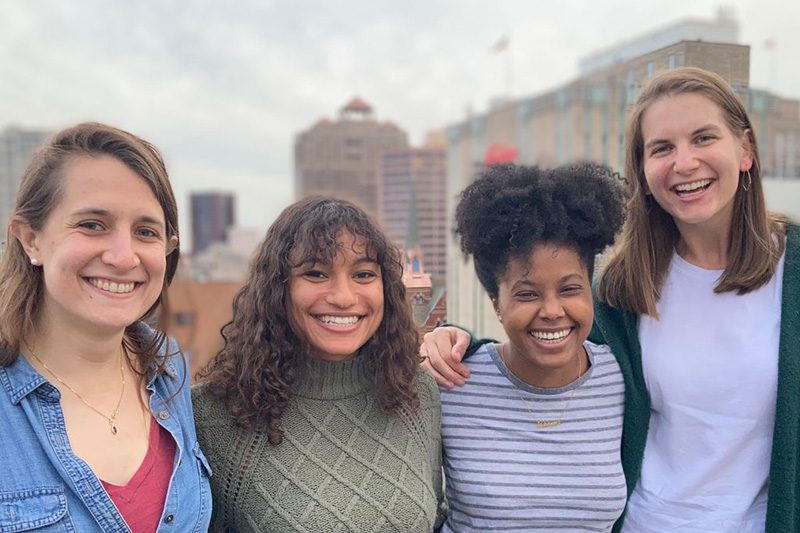From left: Abby Cohen, Maya Saint Germain, Deanna Johnson and Robin Schmid
For the past three months, as part of a Jackson research practicum, our graduate student research team has worked with the support of Women Forward International and in collaboration with the Partnership for Gender Equity to analyze the role of extension and advisory service (EAS) providers in the coffee and cocoa industries. We have begun to successfully identify ways in which a third party might be instrumental in integrating and systematizing gender equity into current and future work done by EAS providers. A major part of providers’ current work focuses on increasing crop yields and improving market access for smallholder farmers so that they may reap greater benefits from the global coffee and cocoa value chains. Although outside the scope of our current research, our collaboration and work to date has led us to consider how EAS providers should account for colonial legacies in their respective sectors. This can be done by empowering smallholder women farmers to define the constraints of their subordination, not as an intervention that grants them the right to speak, but rather by restoring a right that has been taken away.
At the farmer level, the male-dominated nature of coffee and cocoa growing can be seen as a structural indicator of the patriarchal cultures that exist in coffee and cocoa producing countries. To encourage behavioral change, many EAS providers work to resolve the root causes of gender inequality which manifest in women’s financial dependence on men, their lack of decision-making power, and the existence of gender-based violence. Addressing these challenges can result in benefits for women, such as an increase in their financial independence. As research studies confirm that women are more likely than their male counterparts to spend money in ways that benefit their whole family, children also benefit from greater levels of expenditure on nutrition and education, compounding positive results. Because of these potentialities, investment in women’s financial gains is often prioritized. Expanding women’s access to productive inputs such as land, capital, and technical expertise multiplies incomes earned by female farmers and increases the sustainability and value of the entire sector.
Such work is important to address power imbalances in the sector and should be prioritized, yet it is only part of a structural solution. Eliminating barriers to women’s full participation in farming communities is often a target for EAS providers and other actors working in the industry, but these efforts just as often fail to consider the colonial, cultural, and regional histories within the communities in which they work. For example, without grounding our analysis in a post-colonial lens, it may be easy to assume that there is no precedent for female empowerment in farming communities. However, as Nigerian scholar Nkiru Nzegwu points out, the patriarchal structure of coffee and cocoa farming is, in some cases, a lingering vestige of colonization, which forcibly replaced a system where women and motherhood once represented “sources of power and channels of influence.” Without acknowledging this history, interventions by EAS providers seeking to boost productivity have in some cases disempowered female producers, limited their access and agency, and overlooked opportunities to create truly liberating and culturally relevant solutions. Thus, restructuring agricultural systems so that community members – and, in particular, women smallholders – replace foreigners in spearheading the deconstruction of women’s barriers to entry becomes an act of decolonization as well as one of female empowerment.
Additionally, as EAS providers focus on increasing women’s access to land as another way to remove barriers, liberation through land ownership must also confront the legacies of colonialism. The concept of land as property was intrusively introduced alongside forced cultivation on the African continent, leading to manufactured gender inequalities in agriculture. Nigerian gender scholar Oyeronke Oyewumi explains how the introduction of cash crop production on Nigerian land had serious implications for women’s circumstances by generating “new wealth from which women were by and large marginalized,” making land valuable in a new way, excluding women from that value, and creating an environment of forced labor. Discussions surrounding inequality in land ownership within Nigeria cannot overlook the fact that property ownership, like patriarchy, is not inherently African.
While the introduction of land ownership and formalized capital markets characterized the colonization of the continent, choosing to deprioritize land ownership and market integration efforts for women today because of their colonial roots also ignores the fact that women do currently experience material disadvantage, marginalization, and violence as a result of modern-day hierarchies of power. How might communities drive gender-sensitive solutions that take into account, for example, understandings of communal land ownership, rather than further imposing Western ideals of individualized property? EAS providers must interrogate the origins of gender inequities within agricultural systems such as the coffee and cocoa sectors and incorporate greater community voice into their projects and programs. To begin to challenge legacies of colonization, EAS providers must employ culturally-relevant solutions to gender marginalization. But to truly disrupt post-colonial patterns, women need to have full agency to identify oppressive power structures and reimagine a transformative future for themselves.
Learn more about the research carried out through our partnership here.
The views expressed in this post are those of the Yale graduate student research team and are not meant to represent the views held by The Partnership for Gender Equity or Women Forward International.
